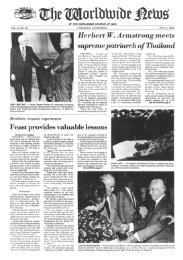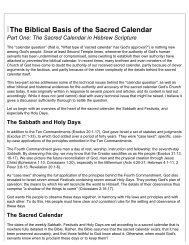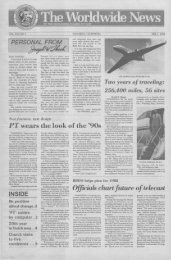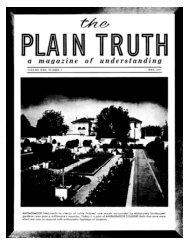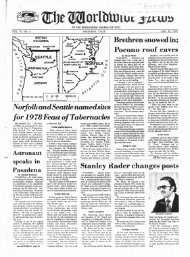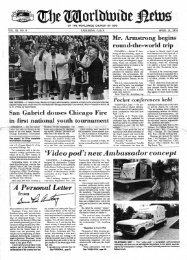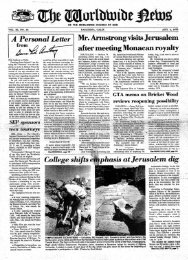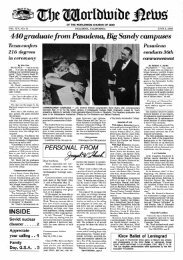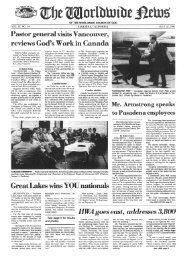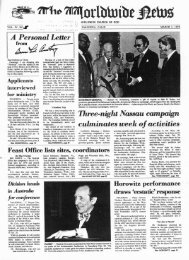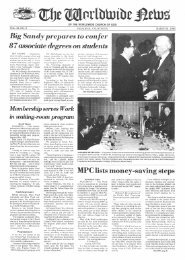Plain Truth 1958 (Vol XXIII No 01) Jan - Herbert W. Armstrong ...
Plain Truth 1958 (Vol XXIII No 01) Jan - Herbert W. Armstrong ...
Plain Truth 1958 (Vol XXIII No 01) Jan - Herbert W. Armstrong ...
Create successful ePaper yourself
Turn your PDF publications into a flip-book with our unique Google optimized e-Paper software.
<strong>Jan</strong>uary, <strong>1958</strong> The PLAIN TRUTH Page 17<br />
to get a little impatient at this youthful<br />
aggressiveness. “It seems you don’t understand<br />
plain English. I said, WE DON’T<br />
NEED ANY HELP!”<br />
<strong>No</strong>w it was my turn to become a little<br />
nettled.<br />
“Mr. Miles,” I came back, more positively<br />
than ever, “I’m surprised at you.<br />
Isn’t this a NATIONAL magazine? Isn’t<br />
this an institution of notional importance?”<br />
“Yes, of course,” he responded.<br />
“Well then, do you mean to tell me<br />
that an organization of national scope<br />
and influence cannot-or is not interested<br />
in finding a way to create an opening<br />
for an ambitious, energetic young<br />
man like me? Do you realize that you<br />
probably don’t get a chance once in several<br />
years to add a man of my caliber,<br />
my talents, and ambition and will to<br />
work to your staff! Why, you can’t afford<br />
to pass up this opportunity. I’ll grow<br />
with your organization-I’ll develop rapidly<br />
into a very valuable man. Of course<br />
you can create an opening! As I said,<br />
I’ll report for work the first Monday in<br />
next month.”<br />
“Well, I haven’t the slightest idea<br />
what we’d have you do,” Mr. Miles was<br />
beginning to weaken a little.<br />
I became more cocky than ever.<br />
“Oh, pcppycock, Mr. Miles,” I snapped,<br />
disgusted. “Hand me a copy of that lousy<br />
sheet of yours! ” This was commonly used<br />
advertising terminology.<br />
Next, the back cover I saw two or<br />
three small ads, want-ad style, advertising<br />
stores for sale.<br />
“Do you call these want-ads?’’ I inquired.<br />
“Oh, we don’t have a want-ad section.<br />
We only solicit display ads. Occasionally<br />
a merchant decides to quit and sell out,<br />
and sends in a small want ad to sell his<br />
business.”<br />
“Well, I happen to know that hundreds<br />
of small merchants are going broke<br />
all the time, over the whole country.<br />
<strong>No</strong>w, supposing you had a full page, or<br />
even two pages of these store-for-sale<br />
ads every month. The rate for these small<br />
ads is a lot higher than the display rate<br />
by the page. One page of want ads would<br />
bring in as much advertising revenue as<br />
three or four pages of display ads,<br />
wouldn’t it?”<br />
“Well, yes,” admitted Miles, rather<br />
reluctantly, “but we have no way of<br />
selling ads of that sort.”<br />
“And,” I persisted, “if any advertising<br />
solicitor could put three or four pages of<br />
new business in The Journal every issue,<br />
he’d be worth putting on the staff,<br />
wouldn’t he?”<br />
“Well, I suppose so, but-”<br />
“<strong>No</strong> ‘buts’ about it!” I was real cocky<br />
and confident by now. “I can put one or<br />
two full pages of want ads of busiaessesfor-sale<br />
in every issue of The Journal.<br />
One thing I’ve learned is how to bring in<br />
want-ads by mail. So, if I have to create<br />
my own opening, I can do it. I’ll report<br />
for work the first Monday morning in<br />
next month.”<br />
“Well,” came a last objection, “we<br />
can’t pay you a very high salary. We<br />
couldn’t pay you over $10 a week.”<br />
“Who said anything about salary?” I<br />
rejoined. “I still live at home with the<br />
folks. I’m not coming up here for the<br />
salary I make now, but for what I can<br />
learn, and the salary I will make, later.<br />
I’m hired at $10 per week,” rising and<br />
extending my hand. “All I ask is that you<br />
agree to raise my salary as fast as I earn<br />
it. See you in two weeks.”<br />
My First Display Ad<br />
All this was along about July or<br />
August, 1912. I do not remember now,<br />
after more than 45 years, whether I was<br />
actually put to work on building a page<br />
or two of want-ads by direct mail solicitation;<br />
but it seems, in the dim distance<br />
of memory, that I did bring in a page<br />
or more of want-ads the first issue or two<br />
or three.<br />
In any event, I was not long on wantad<br />
work. I was assigned to the Service<br />
department, directly under A. I. Boreman.<br />
For some little time I was given<br />
routine office work, with a certain<br />
amount of correspondence to answer. For<br />
this work, I was given a stenographer<br />
and a dictaphone. During this period I<br />
remember breaking in a number of<br />
different stenographers. As soon as a<br />
new girl became experienced enough to<br />
be efficient, she was taken away from me,<br />
and a new green girl fresh out of business<br />
college assigned to me.<br />
It was not long until I was given<br />
opportunity to start writing and designing<br />
display ads. As mentioned above, this<br />
Service Department was a sort of trade-<br />
paper advertising agency. We handled<br />
the trade-paper division of the advertising<br />
budget of manufacturers who sold<br />
thru retailers. As a rule the larger advertising<br />
agencies were glad to relinquish<br />
the trade-paper portion of any<br />
client’s advertising. They were primarily<br />
interested in consumer media.<br />
I shall never forget the first ad Mr.<br />
Boreman assigned to me to write and<br />
lay out. I have mentioned before that I<br />
had been studying every book on advertising<br />
writing I could get hold of. I had<br />
studied books on Psychology, and on<br />
advertising-psychology. I had diligently<br />
read the trade journals in the advertising<br />
field-Printers lnk and Aduertishg 6<br />
Selling. I had studied diagrams of dedp<br />
and lay-out of ads. But as yet I had received<br />
almost no experience in actually<br />
writing and designing the layout of an<br />
ad.<br />
I do not remember at all the nature<br />
of the commodity or service or the name<br />
of the manufacturer I was to write about.<br />
But I shall never forget Mr. Boremm’s<br />
left-handed compliment when I laid the<br />
“dummy” and typed copy before him.<br />
“Mm-hmm-well, <strong>Herbert</strong>, that’s a<br />
pretty good ad,” he drawled, slowly, examining<br />
it critically.<br />
“<strong>No</strong>w, that headline, of course, will<br />
have to be changed,” he continued.<br />
“You’ve used too many words. There’s<br />
nothing in that headline that will catch<br />
the eye. The average reader will be scanning<br />
past it to something else. You have<br />
only the fleeting fraction of a second to<br />
stop the eye. There’s nothing in your<br />
headline to arouse instant interest and<br />
create immediate suspense-nothing to<br />
make the reader say, ‘Well, I never<br />
thought of thhat! I want to read that!’ or,<br />
to say ‘<strong>No</strong>w that’s what I’ve always wondered<br />
about,’ so he’ll want to read on.<br />
“The headline is not displayed right<br />
on your lay-out. <strong>No</strong>t enough white-space<br />
around the headline to create contrast<br />
between a bold, black, short headline and<br />
white space around it. Never be afraid<br />
of wasting white space around your<br />
headlines. Never waste white space<br />
around the text matter.<br />
“<strong>No</strong>w next,” continued Mr. Boreman,<br />
“your major sub-head above the<br />
text matter is all wrong. You must gain<br />
attention-stop the eye-in the main<br />
headline-but you must go on to amuse



